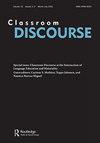Investigating ideology through framing: a critical discourse analysis of a critical literacy lesson
IF 1.6
Q2 EDUCATION & EDUCATIONAL RESEARCH
引用次数: 4
Abstract
ABSTRACT This paper examines classroom discourse from English lessons that implemented a critical literacy unit focused on a contextualised social issue. Utilising the theoretical notion of frame, the analysis of classroom excerpts highlights how ideologies about English teaching and learning at times enter the discourse of the classes, not only overtly through the teacher’s talk but also through the more subtle, interactional orchestration of activities. These ideologies, it is argued, pedagogically position the lessons with reference to a procedural, exam-oriented frame, undermining the potential of the content of the talk and the critical literacy unit. Two key implications are drawn from the analysis. First, that in settings with deeply entrenched pedagogic traditions of standards, exam-focused literacy and the attendant instrumentalist view of language education, critical literacy educators may find it helpful to make these ideologies themselves the target of a critical literacy curriculum. Second, it is argued that the notion of frame can be usefully drawn upon in critical analyses of classroom discourse to make visible and understand how ideology as an interpretive framework shapes classroom talk and the learning made possible by that talk.透过框架调查意识形态:一门批判性识字课的批判性话语分析
摘要:本文研究了英语课堂上的话语,这些课堂上实施了一个专注于情境化社会问题的批判性读写单元。利用框架的理论概念,对课堂摘录的分析强调了英语教学和学习的意识形态有时是如何进入课堂话语的,不仅是通过教师的谈话,而且是通过更微妙的、互动的活动编排。有人认为,这些意识形态在教学上将课程定位为一个程序性的、以考试为导向的框架,破坏了谈话内容和批判性素养单元的潜力。从分析中可以得出两个关键的含义。首先,在标准教学传统根深蒂固的环境中,以考试为中心的扫盲以及随之而来的语言教育工具主义观点,批判性扫盲教育者可能会发现,将这些意识形态本身作为批判性扫盲课程的目标是有帮助的。其次,本文认为,框架的概念可以有效地用于课堂话语的批判性分析,以使人们看到并理解意识形态作为一种解释框架是如何塑造课堂话语的,以及课堂话语使学习成为可能。
本文章由计算机程序翻译,如有差异,请以英文原文为准。
求助全文
约1分钟内获得全文
求助全文

 求助内容:
求助内容: 应助结果提醒方式:
应助结果提醒方式:


